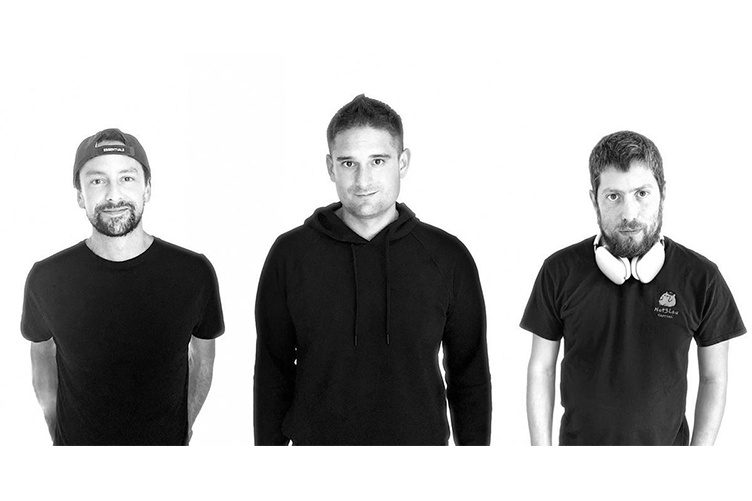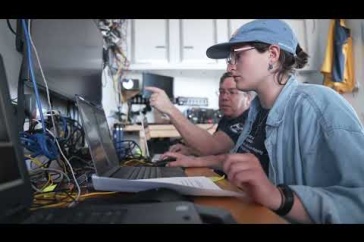
LayerZero Labs co-founders Caleb Banister, Ryan Zarick and Bryan Pellegrino. (Courtesy photo)
The minds behind what is being hailed as a game-changing connectivity breakthrough in the crypto and blockchain world spent much of the winter working together in the Bahamas while being hosted by an investor, just one of several to have recently made a significant financial commitment – totaling in the nine figures – to the work being done by LayerZero Labs.
That’s a long way from where it all began for the three visionaries of the company – as students, InterOperability Lab (IOL) staffers and roommates at the University of New Hampshire.
Caleb Banister ’10, Ryan Zarick ’09 ’11G and Bryan Pellegrino (who left UNH after his junior year) co-founded LayerZero Labs to solve a problem nobody else had been able to effectively solve in crypto and blockchain spaces – to enable secure and direct cross-chain communication, crumbling many long-standing roadblocks between entities.
Forbes recently published an article estimating the barely year-old company at a valuation of $1 billion.
Zarick says he views LayerZero as “the internet of blockchain and crypto,” comparing it to the breakthrough that opened the door to the modern web by linking previously disconnected data centers into one network.
“Before, blockchains seemed very tribal – you picked a chain and that was your chain, and you had to naysay the others. Blockchains have lived in their own walled ecosystem. We are breaking down those walls and those barriers,” Zarick says. “Our mandate is to put LayerZero everywhere, so every blockchain will be connecting.”
The growth has been explosive. The Forbes article highlighted a $135 million Series A+ investment in LayerZero from several entities, co-led by FTX Ventures. PayPal chose LayerZero to make its first ever token investment, Zarick says, and the company also received support from a pair of rival outlets that rarely do business in the same space.
"Before, blockchains seemed very tribal. We are breaking down those walls and those barriers. Our mandate is to put LayerZero everywhere, so every blockchain will be connecting."
“Every major player in crypto is investing or has some stake in us, because they see what we’re unlocking and enabling is so profound,” Zarick says. “Everyone is getting involved.”
And it all started when the founders began researching bridges – or ways to moves assets between chains – during the early stages of their work. Pellegrino asked Zarick to select a bridge he liked to inspire their own pursuit, but Zarick said he didn’t find anything that moved him and chose to start brainstorming something himself instead.
Pellegrino encouraged him to begin building it, and the rest is quickly becoming history.
“When we started doing this, nobody was convinced this was ‘the’ problem to solve, but in 12 months the whole world kind of coalesced around the idea that this is the holy grail of problems to solve,” Pellegrino says of the connectivity issue. “You don’t live through this moment very often – we’re one of the fastest growing companies of all-time, we have one of the highest pre-launch valuations of all-time. It’s about as far right-tail an outcome as you could possibly imagine.”
LayerZero wasn’t the first to wade into those waters, but its solution represented the best combination of security, cost-effectiveness and ease of use, Pellegrino says. And the outcome amounts to a substantial shift in the industry.
The co-founders say their solution is secure enough that it won’t be vulnerable to multi-million-dollar hacks that have plagued the industry in recent years.
“I would say it’s pretty massive,” Pellegrino says. “People have been thinking about this for years, but it would either be unbelievably cost-prohibitive or just way too insecure. We are the first to really hit the medium of solving for that, while also making it applicable on the user experience side. What used to take 35 to 55 clicks to do, we’ve brought basically to a single click. It’s a pretty significant departure.”
LayerZero is not the first company that Banister, Zarick and Pellegrino have partnered on. The trio founded and later sold a daily fantasy sports site several years ago and have worked together on projects off-and-on alongside solo pursuits since leaving UNH. Pellegrino left UNH after three years to travel and play poker professionally, endeavors that allowed him to visit more than 80 counties in eight years. He also started and sold several companies on his own and created a machine learning model that several Major League Baseball teams have purchased.
Banister and Zarick started a software as a service (SaaS) company that serviced the sports data industry, and have done high-end consulting and independent research work together over the past 15 years. The trio also completed what Zarick calls “groundbreaking research” that achieved 5,000 times performance gains over state-of-the-art existing research (by Google DeepMind and Carnegie Mellon University teams) in the artificial intelligence space — gains that were previously “thought impossible,” Zarick says — and published with Noam Brown and Facebook AI Research.
"You wear a lot of hats at the IOL, which really prepares you for the startup life and building companies, and it kind of came full circle with LayerZero."
“In the end, we love to solve impossible problems,” Zarick says.
Four years ago Banister and Zarick moved to Vancouver — where Pellegrino already lived — and a few years later, LayerZero was born. The corporate office remains in Vancouver.
Even before they were business partners, the members of the trio were roommates and best friends at UNH, where their business education took flight. Both Zarick and Pellegrino have significant praise for the IOL, which they say prepared them for the entrepreneurial culture they’ve been part of ever since.
“I give the IOL credit for a lot of the ways we approach problems, from our background in testing and performance,” Pellegrino says. “I think that experience was super critical.”
Says Zarick: “You wear a lot of hats at the IOL, which really prepares you for startup life and building companies, and it kind of came full circle with LayerZero. The IOL was a big reason why I picked UNH, and the experience I got there mixed with the curriculum in computer science made me super well-rounded for business and startups.”
It also gave Zarick a glimpse of the lifestyle he wanted and a push to pursue it. And he hasn’t looked back since.
“I’ve never had a day job,” he says.
-
Written By:
Keith Testa | UNH Marketing | keith.testa@unh.edu
















































